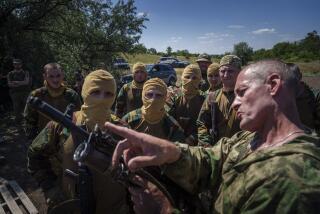Soviet Troops Storm Another Lithuanian Post : Baltics: Interior Ministry’s ‘black berets’ press a campaign against illegal customs checkpoints throughout the rebellious republics.
- Share via
MOSCOW — Soviet Interior Ministry troops stormed the customs office at the airport in the Lithuanian capital of Vilnius on Saturday, the latest in a string of violent attacks that have raised tensions between the Kremlin and all three of the Baltic republics in the last few months.
During that time, Soviet security forces and pro-Kremlin civilians have ransacked and burned dozens of customs checkpoints in Latvia and Estonia, as well as in Lithuania.
The customs posts, which have been declared illegal by Soviet authorities, are symbols of the small republics’ ongoing campaign to become independent from Moscow. Lithuania began building its own border posts after proclaiming independence last year, and the other two followed that lead this year.
In Saturday’s attack, the Interior Ministry forces, called “black berets” because of their headgear, forced Lithuanian customs officials out of their office, confiscated stamps, keys and documents, locked the doors and told the Lithuanian customs officers never to return to work.
“It was a direct threat,” said Vitautus Vatonis, an official at the Lithuanian Interior Ministry. “These black berets say they are fulfilling a decree of (President Mikhail S.) Gorbachev, to liquidate these customs facilities.”
In the course of the Kremlin crackdown on the facilities, as many as eight border posts in one night have been destroyed by black berets, according to Baltic officials. The troops are special Interior Ministry units trained to combat organized crime.
“Every two or three days they burn down another border post,” Vatonis said. “It’s a deliberate attempt to create a tense situation. On our own, we can’t do anything to stop them, and although we continually inform the authorities in Moscow, they take absolutely no action.”
Two customs checkpoints, one on each side of the Latvian-Lithuanian border, were attacked and burned down Friday night by four armed men, three attired in military uniforms, Vatonis said. A grenade was set off in the Latvian facility to destroy it.
No one has been hurt in these most recent attacks, but in several earlier cases border guards were badly beaten or wounded by gunfire, and one member of the Lithuanian customs service was killed.
Dainis Ivans, deputy chairman of Latvia’s Parliament, said his republic views the recent rash of attacks with grave concern. “It’s for sure,” he said in a telephone interview, “a military coup is being planned against us.”
Ivans and other officials said they have no doubt that Kremlin officials are behind the black berets.
Moves by pro-Kremlin forces against Lithuanian and Latvian facilities earlier this year resulted in bloodshed. In Vilnius, Soviet troops stormed a television tower Jan. 13, fatally wounding 14 unarmed civilians. In Riga, Latvia’s capital, four people were killed in a shootout Jan. 20 between black berets and local police at headquarters of the republic’s Interior Ministry.
Although a vast majority of residents of the three Baltic republics have voted in referendums to secede from the Soviet Union and their leaders are all committed to quick transitions to independence, Gorbachev has insisted that they adhere to a lengthly secession process outlined by Soviet law.
The black berets have played a high-profile role in the ongoing battle between the rebellious republics and the Kremlin.
Gapis Stabrine, duty officer at the security department of the Latvian republic, said he has no doubt the black berets are fulfilling instructions of Soviet Interior Minister Boris K. Pugo.
“(They) are bandits under the command of Pugo,” he said. “It works like this: he writes detailed instructions for them a month in advance, seals them in an envelope and sends them to local” offices of the Interior Ministry force.
The frequent attacks are an obstacle in negotiations between the Kremlin and the republics on conditions for secession, Stabrine said.
“It’s really difficult to start negotiations when Moscow is refusing to take responsibility for them,” he said. “How can one establish good relations with a neighbor who is undertaking such actions?”
More to Read
Sign up for Essential California
The most important California stories and recommendations in your inbox every morning.
You may occasionally receive promotional content from the Los Angeles Times.








